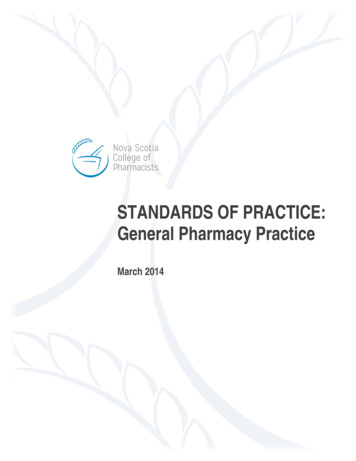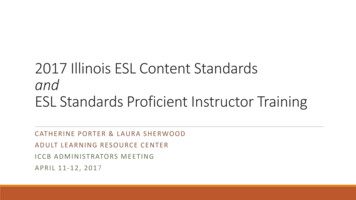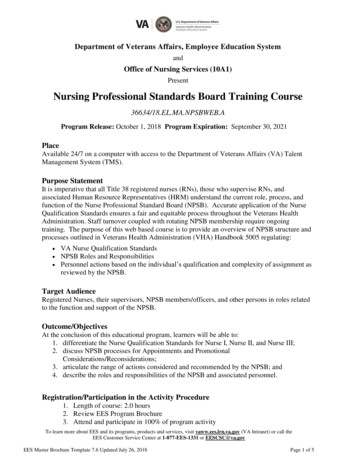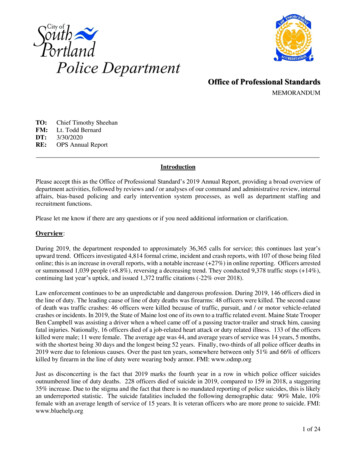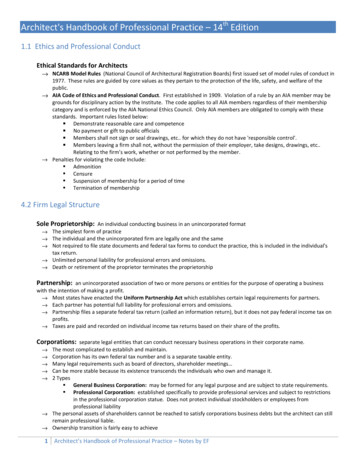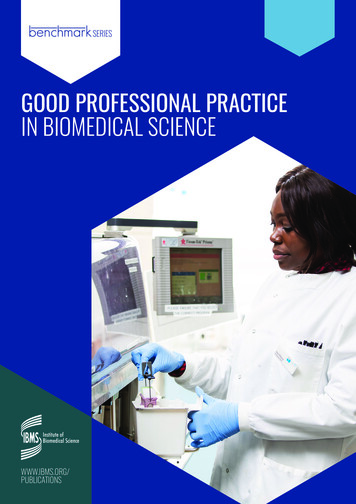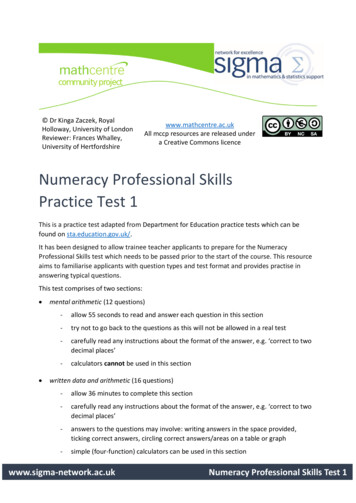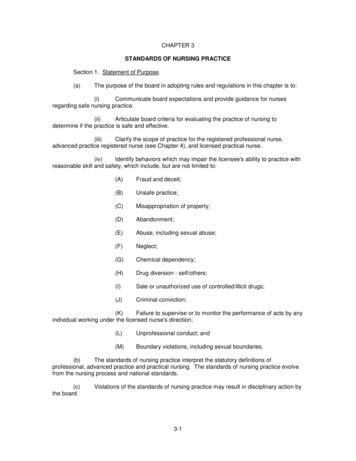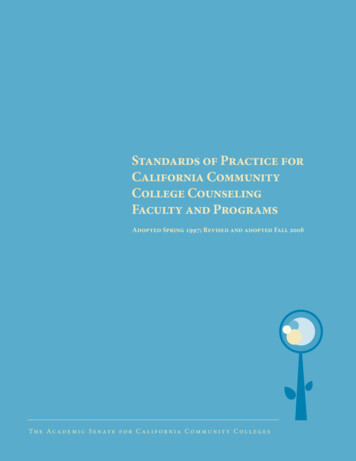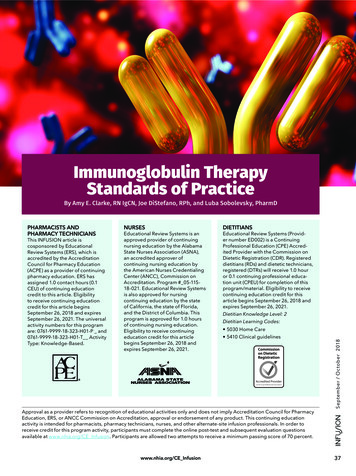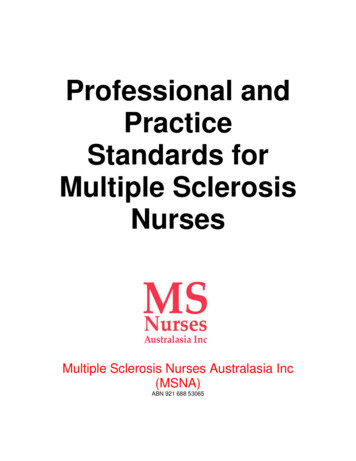
Transcription
Professional andPracticeStandards forMultiple SclerosisNursesMultiple Sclerosis Nurses Australasia Inc(MSNA)ABN 921 688 53065
Table of Contents:SectionPageProject Review Team1Acknowledgements1Introduction2Defining the role of an MS Nurse2Professional Standards – Domains of MS Nursing Practice1. Clinical Knowledge and Practice32. Leadership, Teamwork and Collaboration43. Professional Development64.Research75.Legal and Ethical Practice7Registration Codes, Standards and Guidelines – Australia and New Zealand9Recommended Resources:9Original Project Team9Project Review Team 2016Belinda Bardsley – Nurse Manager, NCRESS, Austin HospitalFiona D’Young – MS Nurse Specialist, Auckland DHBHelen McCarl – MS Nurse Consultant, MS Society of SA & NTImogen Milner – MS / Epilepsy Nurse Specialist, Wellington HospitalTim O’Maley – MSNP, MS QueenslandAcknowledgements:The Executive Committee representing the Members of MSNA Inc would like to acknowledge theefforts that have gone into the development of this resource. The time and commitment of theoriginal project team and review team is gratefully appreciated.The Project Team would like to acknowledge the input from the MSNA Executive Committee andall MSNA Inc and MSHPN members in the development of this resource.The Project Team and MSNA Executive Committee would like to gratefully acknowledge the workfrom other professional bodies and organisations that have undertaken similar projects anddocuments that have provided a framework and resources for the MSNA Professional andPractice Standards. In particular: Australasian Neurosciences Nurses Association (ANNA) Australian Nursing and Midwifery Council (ANMC) Nursing Council of New ZealandUK MS Specialist Nurses Association (UKMSSNA)MSNA Inc Professional and Practice Standards Revised 20161
Introduction:Multiple Sclerosis (MS) nurses are a subspecialty in neuroscience nursing and have become adynamic group who have worked hard to ensure that high quality, evidence based nursing care ispromoted and delivered for all people diagnosed with MS (PwMS). With the pace of ongoingchange, and the need for high quality specialised services for PwMS, it is essential that nursesworking in this area have the knowledge, skills and competence to provide accurate informationand deliver effective and evidence based care for and with PwMSThis resource is designed for all MS nurses and draws upon several existing “ProfessionalStandards” documents. The MSNA Executive Team and State Delegates hope that thisdocument will become a useful tool for all MS nurses; to evaluate and further develop their skillsand role whilst working in the field of MS Nursing. The Professional and Practice Standards areintended to provide meaning and value to MS nursing practice and may act as a guide to nursesseeking to enhance their practice, and as a learning tool to support practitioners who are new tothe field of MS nursing.As with all Professional Standard documents, this resource has been developed to reflect currentbest practice standards in the delivery of MS Nursing care regardless of their work positions,environments or the contexts of their service delivery. As such this document must be fluid andwill, as appropriate, be reviewed to ensure it remains current, relevant and reflective of true bestpractice and MS care.Of key importance to the Standards contained herein are the National Competency Standards forthe Registered and Enrolled Nurse in all countries affiliated with MSNA Inc. These must be readin conjunction with the MSNA Professional and Practice Standards and the MS Nurse must striveto achieve the following points in their daily practice regardless of role, position or experience inthe MS field: MS Nursing practice is characterised by increased knowledge, skills and understandingof MS and the ability to make the links between identifying the salient issues in asituation and ways of responding to them in practice. The MS nurse is able to detect patterns of change with MS events based on theirknowledge, skills and understanding of MS. The MS Nurse is able to provide information,education and emotional support for family / support network; whilst meeting the needsof PwMS. The MS Nurse will have a strong understanding of the possible future needs andoutcomes for PwMS and their support network. In addition, based on long termrelationships with the individual, is able to identify relevant past events and experiencesthat may impact on future issues. Practice is characterised by fluid and skilled performance, based on sound judgementand knowledge and understanding of MS. MS Nurses have the ability to develop a holistic understanding of the world of a PwMS.Addressing their issues and concerns and work with the person to understand theirpriorities. Thus ensuring good direction and guidance through provision of MS Nursingcare. The MS Nurse plays a pivotal role in terms of guiding services and education for thePwMS, their support network and other relevant health professionals based on soundMSNA Inc Professional and Practice Standards Revised 20162
knowledge, a breadth of vision and commitment to evidence based clinical practice, careand support.Defining the Role of an MS Nurse:The role of the MS Nurse has for many years been recognised as an efficient and crucial role inthe setting of this chronic and unpredictable disease. The MS Nurse has a vital role to play ininforming and educating people with MS, helping them determine the best treatment to suit boththeir disease and lifestyle, ensuring they are well-managed and able to adhere to treatment,advocating for them, triaging, trouble-shooting, and managing emotional and clinical issues asand when they arise.Domains of Professional Practice:Domain 1: Clinical Knowledge & PracticePractice Standards:1.1 Demonstrates sound and current knowledge of MS and the needs of PwMS and their supportnetwork.1.2 Conducts a comprehensive and systematic nursing assessment1.3 Provides comprehensive, safe and effective evidence based nursing care to achieve identifiedindividual / group health outcomes1.4 Evaluates progress towards expected health outcomes in consultation with individuals /groups, significant others and interdisciplinary health care teamPerformance CriteriaManagement Demonstrates sound and expanding knowledge of disease management and therapeuticoptions for effective symptom management for PwMS. Work with the person with MS and their support network, linking when appropriate withother health professionals to design and implement care pathways in anticipation ofpotential problems.Diagnostic Phase Develops a continuing relationship, facilitating individual and support network decisionmaking in managing the broader impact of the diagnosis. This may include the impact onwork, relationships, leisure and finances.Minimal Impairment Phase Uses clinical assessment skills to perform a holistic assessment. Identifies silent and subtle changes through comprehensive understanding of thepathology and presentation of MS. Introduces and evaluates management programmes that are sensitive to the individual’sspecific needs, in partnership with them.Moderate Disability Phase Recognises the accumulation of symptoms and disability.MSNA Inc Professional and Practice Standards Revised 20163
Highlights the rehabilitation potential of the MS patient to the multi-disciplinary team inorder to develop rehabilitation strategies, using timely interventions to maximisepotential.Severe Disability Phase Works proactively with agencies to promote good individualised quality managementstrategies tailored to choice and need. Mediates between services and facilitates complex ethical decision-making. Encourage PwMS and those close to them, to discuss issues surrounding quality of life,death and dying. Support them in meeting their wishes and plans as legally and ethicallyable.Classification Discusses the application and limitations of the current diagnostic criteria in clinicalpractice and understands the rationale for their application. Articulate the application of the revised McDonald (2010) criteria to research agendas.Pathology Demonstrates knowledge of the current theories of MS pathology, genetic and neuroimmunological research. Explains the natural history data in MS and current research models of disease includinganimal models when relevant and appropriate.Outcome Measurement Identifies appropriate scales and assessment tools for specific clinical measurement. Understands the significance of reliability and validity data related to outcome measures.Cognitive Impact Recognition of subtle cognitive impairment and its impact on psychosocial assessmentand interviews.Advanced / Expert PracticeDemonstrates advanced knowledge of MS and utilises this to identify and manage the needs ofclients / patients and their support network living with MS.Teaches colleagues about new theories and possible future research questions; and expandstheir level of knowledge and capacity for critical analysisEducates other health professionals on disease presentation, symptoms and course.Domain 2: Leadership, Teamwork and CollaborationPractice Standards:2.1 Plans MS nursing care in consultation with individuals/groups, significant others and theinterdisciplinary health care team – actively encouraging informed decision making and selfmanagement frameworks2.2 Proactively identifies and seeks to manage issues relating to language, cultural and spiritualsensitivity and diversity.MSNA Inc Professional and Practice Standards Revised 20164
2.3 Participates in quality improvement activities in relation to practice outcomes, servicedevelopment and standards / guidelines.Performance CriteriaPartnerships Works with people with MS to ensure they are given sufficient information, in a mannerthey can understand, in order to make informed choice and are fully involved in their careand treatment decisions. Maintain respect for their independence, values and culturalviews. Works collaboratively with existing partnerships with health, social, voluntary andindependent sectors.Influence and Leadership Supports local service provision through participation in multi-disciplinary caremanagement.Professional Networking Initiates and fosters new networking opportunities; such as networking with individualsworking in other specialist areas.Relationships with Industry Uses patient / client experience to influence the pharmaceutical industry to improvepatient care, supports and information resources.Quality Improvement Activities Leads and participates in case review activities Leads and participates in clinical and service audits Identifies the need and actively pursues quality improvement opportunities with theinclusion of people with MSTrust and Self-Management Empowers the individual and their support network to identify, and work towardsachieving, realistic goals of self-management whilst maintaining hope for the futureAdvocacy Ensures the health and community service consumers’ voice is recognised in serviceimplementation and development; within resource constraints. Creates opportunities at different levels for PwMS to play a part in the development oflocal servicesAdvanced / Expert PracticeFunctions autonomously utilising specialist skills and knowledge, collaborating with theinterdisciplinary health care team to provide comprehensive MS nursing and careActs as a positive role model to colleagues and other health professionals, promoting thespecialty of MS NursingAdvocates at a strategic commissioning level on behalf of the local MS population to ensureservices are developed and delivered effectively.MSNA Inc Professional and Practice Standards Revised 20165
Develops new partnerships with health, social, voluntary and independent sectorsInfluences local service provision by demonstrating MS nursing leadership and participation inmulti-disciplinary professional projectsParticipates on a national and international basis with relevant professional bodiesDomain 3: Professional DevelopmentPractice Standards:3.1 Maintains own professional and academic development portfolio; participating in relevantprofessional development opportunities to enhance MS Nursing care3.2 Uses best available evidence, standards and guidelines to evaluate professional performanceand practice3.3 Demonstrates and reflects upon strategies used to manage own responses to theprofessional work environment3.4 Uses a clinical governance / evidence based framework to identify gaps in knowledge andskills and initiates strategies to address thesePerformance CriteriaTeaching Participates and contributes to formal and informal educational opportunities andprofessional development activities Disseminates knowledge by writing for publications and presenting at conferences. Is acknowledged as an approachable and valuable resource for MS teaching andexpertise.Use of Evaluation Tools Promotes innovative ways to optimise learning. Uses evaluation to develop new and innovative programmes for higher-level practice. Demonstrates reflective practice to identify professional development needs Participates in, as appropriate: Self appraisals & Professional Development Plans(PDP)Teaching People with MS Leads the development of local and / or regional education initiatives for PwMSincorporating the concept of the expert patient at all stages of the disease. Maximises the use of developing technologies as they become available, for exampledirect access between clinicians and patients via web-based systems. Whenever possible and practical, supports PwMS to deliver, with or without MS Nursesupport, relevant and appropriate educational activities to their peers.Advanced / Expert PracticeDevelopment of Educational Programmes Identifies and responds to the learning needs of colleagues who need to developadvanced knowledge and skills. Develops and sustains productive partnerships, playing a part in the develo
Multiple Sclerosis (MS) nurses are a subspecialty in neuroscience nursing and have become a dynamic group who have worked hard to ensure that high quality, evidence based nursing care is promoted and delivered for all people diagnosed with MS (PwMS). With the pace of ongoing
